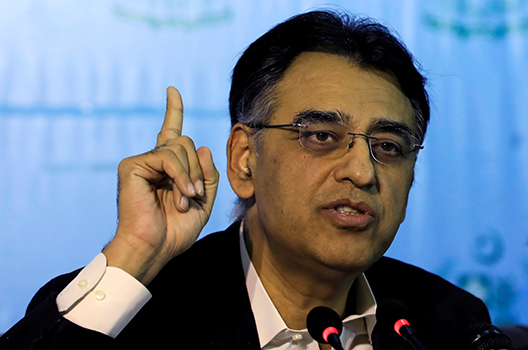A new set of tax reforms announced by Pakistani Finance Minister Asad Umar on January 23 follows pressure from the International Monetary Fund (IMF) from which Islamabad is looking to secure another loan. The bill, which seeks to boost foreign and domestic investment, comes as Pakistan faces a balance-of-payments crisis on its foreign loans intensified by currency devaluations and rising energy imports.
The tax measures would be Pakistani Prime Minister Imran Khan’s second set of fiscal reforms since taking power in July 2018.
What’s in the reform package?
The incentive package, dubbed the “mini-budget,” aims to simplify and decrease taxes on businesses, increase energy investments, and raise manufacturing production.
Widespread tax evasion in Pakistan has severely decreased government revenues. Small businesses argue that the current system is complicated and expensive. The changes are designed to encourage filing while decreasing the tax burden on small- and medium-sized businesses. These cuts were offset by increased rates on luxury goods, such as high-end phones and cars.
Among the various measures in the energy sector, there are significant reductions and freezes on taxes and import duties for solar panels and wind turbines, diesel engines, and machinery used to create new power plants on greenfield sights.
The reform package’s attempts to jumpstart manufacturing include decreases on duties for cloth, plastic, certain types of wood, and chemicals to boost the textile, furniture, and toy manufacturing sectors.
Why now?
The proposed reforms come as Pakistan faces a balance-of-payments crisis on its foreign debt repayments exacerbated by the recent depreciation of the Pakistani rupee. As a result, Khan’s government has spent much of its first year securing aid packages from foreign countries. Although Pakistan received $11 billion in loans from China, Saudi Arabia, and the United Arab Emirates, the money is only expected to last through June of 2019.
In his Naya Pakistan [New Pakistan] platform, Khan has made it a priority to boost exports and revenue, two goals his government insists are furthered by the proposed tax reforms. The new legislation also comes as Pakistan looks to secure its thirteenth loan from the IMF since 1980. Despite several visits and meetings between the two sides, IMF officials insist Pakistan must do more to reform its tax system. The proposed reforms are an attempt to do that.
What has been the reaction to the proposed reforms?
Industry in Pakistan has had a generally positive response to the new proposal. Both the Overseas Investors Chamber of Commerce and Industry and the Karachi Chamber of Commerce have lauded the reduction and elimination of tax burdens. Ehsan Malik, president and chief executive officer of the Pakistan Business Council, applauded the decreases in tax rates and supported measures that would make it easier to invest in energy projects. However, he also expressed concern over accountability measures.
Opposition Pakistan People’s Party Senator Sherry Rehman expressed her disapproval because of a potential increase in commodity prices. She accused Khan of implementing the tax measures solely to placate the IMF.
How is the proposal being received outside Pakistan?
Khan ran his campaign on the promise that he would re-examine Pakistan’s involvement in the Chinese-Pakistan Economic Corridor (CPEC) in which China plans to invest more than $60 billion primarily in Pakistan’s infrastructure and energy sectors. CPEC is a vital part of China’s Belt and Road Initiative. Coupled with currency depreciation, rising energy demand, and weak exports, the investment has led to the accumulation of unsustainable debts resulting in the current balance-of-payment crisis.
Pakistan’s involvement in CPEC has complicated its ability to obtain a loan from the IMF. In recent years, the United States has been hesitant to assist countries that find themselves indebted to China. Given US contributions and influence at the IMF, it is unlikely a loan would be approved without US consent. When asked about potential IMF assistance to Pakistan, US Secretary of State Mike Pompeo said that “there’s no rationale for IMF tax dollars… to go to bail out Chinese bondholders or China itself.”
Khan’s government argues that energy imports and weak exports are draining Pakistan’s ability to make payments on foreign loans. Through these tax reforms, his government hopes to cut energy imports, increase revenue from exports, and limit dependence on foreign countries. However, it remains to be seen whether the newest round of reforms will convince the IMF, and the United States, that Pakistan is serious about reform independent of China.
Sahir Amlani is an intern in the Atlantic Council’s South Asia Center.
Image: Pakistan's Finance Minister Asad Umar gestures during a news conference in Islamabad, Pakistan, November 30, 2018. (REUTERS/Faisal Mahmood/File Photo)
